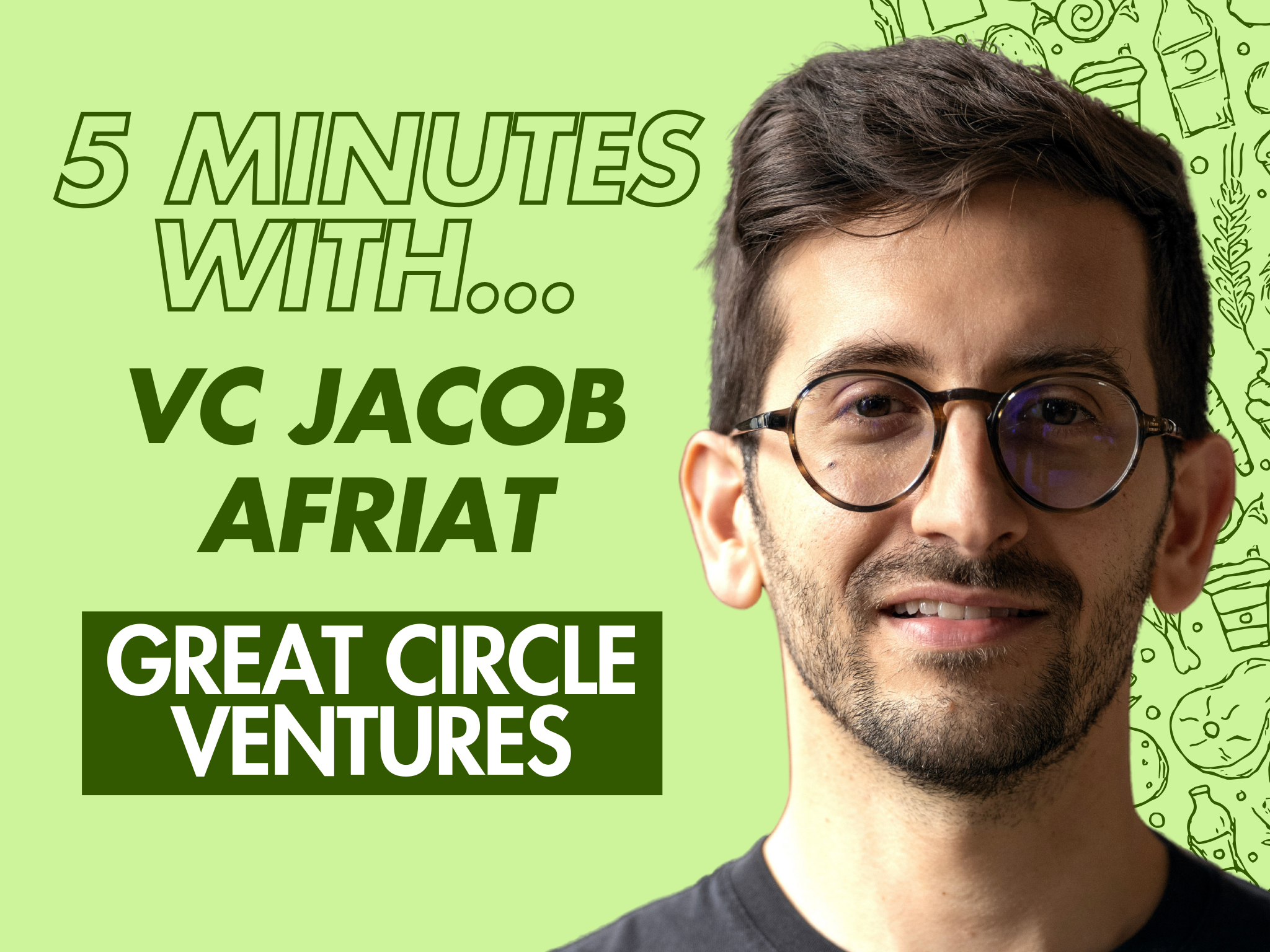
In our interview series, we quiz future food investors about the solutions that excite them the most, their favourite climate-forward restaurant, and what they look for in successful founders.
Jacob Afriat is the General Partner at Great Circle Ventures.
What future food technologies most excite you?
I’m particularly excited about the application of AI across the food value chain—from ingredient discovery to formulation, bioavailability, and even optimising sensory properties like texture and mouthfeel. AI has the potential to dramatically reduce development cycles, personalise nutrition, and bring precision to taste and function in ways we’ve never seen before.
What are three future food verticals you are actively looking at for 2025?
- ‘Beyond the label’ food safety and transparency
- Precision nutrition and functional food systems
- Next-gen preventative nutrition
What do you consider the food tech sector’s greatest achievement in the past five years?
One of the most encouraging achievements has been the consumer’s growing openness to changing habits. The rapid adoption of plant-based dairy and meat alternatives – even with imperfect products – showed that the market is ready for better options.
While these categories are currently facing headwinds, mostly due to challenges in balancing taste, health, sustainability, and price, we believe the next wave of alternatives that get these four pillars right could see even faster and broader adoption.
If you could wave a magic wand, how would you fix plant-based meat?
I’d create a product that’s not just an alternative to meat, but superior to it – especially from a health and nutrition standpoint. Today’s plant-based meats are often ultra-processed and nutritionally underwhelming. The ideal version would be minimally processed, clean-label, and deliver functional health benefits without compromising on taste or texture.
What’s the top trait you look for in a founder?
Grit. Founders building in food and climate face long timelines, tough science, and sceptical markets.
Grit – the relentless drive to keep pushing forward despite setbacks – is what sets apart those who endure and ultimately succeed.
The One That Got Away: What is the deal you wish you had gotten into, but didn’t?
Function Health. I had a chance to invest very early – an opportunity that would have returned over 150x in just three years. At the time, it felt slightly outside our core investment thesis, but in hindsight, it was clearly aligned with the broader shift we believe in: empowering consumers with deeper health data and personalisation.
What do you consider your most successful future food investment so far?
While it’s still early, I’m particularly excited about our investment in Zya, which is pioneering a new approach to sugar reduction. They’re developing a proprietary ingredient that could disrupt the way we think about sugar alternatives. It’s too early to call it a success, but the potential is certainly promising, and we’re watching it closely as they move through their early stages of development.
What has been your most disappointing investment so far?
The investments we’re most disappointed with are those where we had to move too quickly and didn’t spend enough time evaluating the founders. It’s a reminder of how important it is to take the necessary time to get to know the team and ensure alignment before committing.
What do people misunderstand/get wrong most about VC?
One common misconception is that venture capital is about quick, big returns. People often point to short-term successes, but what they miss is that true value creation in VC takes time. While some companies may see huge returns in the short run, those gains are often unsustainable.
Over a longer timeline, many of these companies experience an adjustment as they work through scaling challenges or market realities. The real value comes from supporting businesses over the long haul, helping them evolve, and creating sustainable growth.
What is the most ‘future food’ thing you have eaten this month?
I recently tried a freeze-dried whole broccoli snack from Veggie Vice. While it might not seem like the most futuristic food at first glance, I was really impressed by how this simple, well-known technology – freeze-drying – can be applied to preserve the full nutritional profile of fruits and vegetables.
It was amazing to see how the shelf life of a vegetable can be extended while maintaining its integrity and minimal processing. It’s a great example of how innovation doesn’t always need to be groundbreaking technology – sometimes, it’s about reimagining the potential of existing tools.
Where is your favourite climate-forward restaurant/dish/place to eat anywhere in the world?
I recently discovered a small gem near my office in Madison Square Park, New York, called Rooted. It really stood out for its commitment to simplicity and transparency. The menu is centred around a few carefully chosen ingredients, and they’ve made a conscious decision to avoid using seed oils.
It’s refreshing to see a restaurant that prioritises both sustainability and thoughtful sourcing while creating delicious, mindful dishes.
What’s your ‘why’? What motivates you to do what you do?
In a world that moves so quickly and where we’re constantly inundated with information – often contradictory – it’s incredibly satisfying to focus and try to identify the real “blue line”. I’m driven by the challenge of predicting the next trend, cutting through the noise, and finding opportunities that align with true, long-term value.
The post 5 Minutes with A Future Food VC: Great Circle Ventures’s Jacob Afriat appeared first on Green Queen.
This post was originally published on Green Queen.